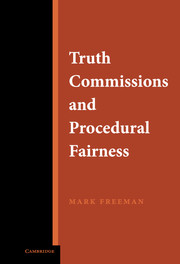Preface
Published online by Cambridge University Press: 27 October 2009
Summary
Since the Nuremburg trials and even more so since the end of the Cold War, formal mechanisms to address human rights abuses have increased dramatically, both in number and variety. Today there are, for example, a permanent International Criminal Court, two ad hoc international criminal tribunals (the International Criminal Tribunals for the former Yugoslavia and for Rwanda), and several mixed national-international criminal tribunals. There are three regional human rights courts: the European and Inter-American Courts of Human Rights, and the African Court on Human and Peoples' Rights. There is also a multitude of quasi-judicial and nonjudicial human rights mechanisms, including seven UN treaty bodies and two regional human rights commissions.
Most contemporary mechanisms for the vindication of human rights follow well-established rules of procedure. International criminal tribunals, for example, abide by internationally recognized standards of a “fair trial.” Regional human rights courts and commissions have followed essentially the same rules of procedure for, in some cases, more than three decades. Yet there are a number of human rights mechanisms for which rules of procedure remain ad hoc and vague. This book constitutes a systematic attempt at outlining fair procedures for one such mechanism: the truth commission.
A truth commission is an ad hoc, autonomous, and victim-centered commission of inquiry set up in and authorized by a state for the primary purposes of (1) investigating and reporting on the principal causes and consequences of broad and relatively recent patterns of severe violence or repression that occurred in the state during determinate periods of abusive rule or conflict, and (2) making recommendations for their redress and future prevention.
- Type
- Chapter
- Information
- Truth Commissions and Procedural Fairness , pp. xiii - xviiiPublisher: Cambridge University PressPrint publication year: 2006



